Environment, Ideology, Political Parties

Key Findings
In the waning days of 2016, the outgoing Obama administration took the final steps needed for the United States to join the Paris Climate Agreement— an international framework for reducing greenhouse gas emissions to address climate change. Less than a year later, the new Trump administration had already signaled its intention to leave the accord — a symbolic but consequential act given the voluntary and non-binding nature of participation in the agreement.
This policy reversal exemplifies the polarized nature of climate change in American politics. While many topics are divisive, there are few where views about the basic facts, as well as the solutions, are as deeply contested. Climate change has become a top priority issue for Democratic voters, particularly in the liberal wing of the party.(i) But prior analysis by the Democracy Fund Voter Study Group suggests that the importance of climate change is one of the most divisive issues for Democrats and Republicans.
The stakes are high. The United Nations International Panel on Climate Change — a collection of the world’s foremost climate scientists — has shown that climate impacts are already occurring, will get worse, and that strong and swift action is crucial to warding off the worst effects that climate change could cause.(ii) Understanding Americans’ views on this issue, as well as how these views are changing, is of vital importance.
New data from the Voter Study Group sheds light on Americans’ shifting views of climate change. The December 2019 VOTER Survey (Views of the Electorate Research Survey) was conducted from November 22 to December 23, 2019. It is unusual among public polls because it draws from a longstanding panel of voters who have been interviewed periodically since December 2011. The nature of this survey allows us to track the same group of voters over time and see how their views have shifted.
Methodological Note
In December 2011, respondents were asked the following questions about global warming:
Since that time, it has become much more common to refer to the variety of phenomena associated with changes in average temperatures and weather patterns as “climate change.” In order to test whether people reacted differently to these terms and to hedge against the possibility that changing or maintaining this wording would bias results, we conducted an experiment. In this latest wave, half of respondents were given the original “global warming” wording, while the other half answered questions where that term had been switched to “climate change.”
The results — presented in the last section of this brief — suggests that Americans do not react differently to these terms. As we do not find evidence that the two terms evoke dissimilar responses, the analysis presented throughout this brief combines the answers from respondents who received different wording. This methodological choice does not appear to have any substantive effect on the findings.
Americans today are more certain that climate change is occurring. In December of 2011, more than one-third (37 percent) of Americans said they thought that climate change was definitely happening, while 27 percent said it was probably happening. By contrast, respondents from the latest VOTER Survey wave, conducted in November and December of 2019, were more likely to say it was definitely happening (48 percent) and less likely to say it was probably happening (19 percent). Notably, while Americans are expressing greater certainty with this shift, the combined number of Americans saying it is definitely or probably happening has increased only slightly (from 64 percent to 67 percent).
Figure 1
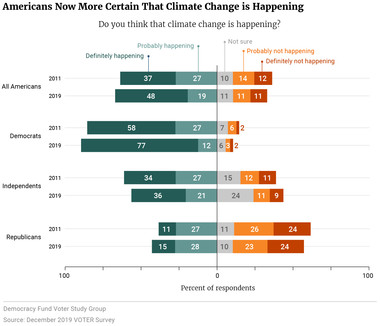
These shifts have not occurred equally across partisan groups. Democrats in 2011 were substantially less likely to say that climate change is definitely happening compared to Democrats in 2019 (58 percent vs. 77 percent). They are also slightly more likely to believe it is occurring overall than they were in the past (85 percent in 2011 vs. 89 percent in 2019).(1)
Changes have been less dramatic among Republicans and independents. While 38 percent of Republicans said climate change was probably or definitely happening in 2011, 43 percent said the same in 2019. By contrast, there was actually a small decline in the number of independents who expressed this belief between 2011 (61 percent) and 2019 (57 percent). Notably, there has been an increase in the number of independents who say they are not sure if climate change is occurring or not during this time period (13 percent in 2011 vs. 25 percent in 2019).
Among those who think it’s at least possible climate change is occurring, people today are about as likely to say climate change is a serious problem as they were in the past.(2) About 7 in 10 Americans said that climate change was somewhat or very serious in both 2011 (68 percent) and 2019 (72 percent). Despite this overall stability, perceived intensity of the problem has increased. While 37 percent of Americans said climate change is a very serious problem in 2011, more than half (52 percent) of Americans said the same today.
Once again, these shifts did not occur equally among partisan groups. Compared to 2011, Democrats today are a little more likely to think climate change is a somewhat or very serious problem (87 percent then vs. 93 percent today). However, this small shift overall hides a significant increase in the intensity of concern. While a slim majority (54 percent) of Democrats thought climate change was very serious in 2011, almost 8 in 10 (78 percent) say the same today.
(1) Here and throughout the brief, references to Democrats and Republicans include independents who say they lean toward one of the parties.
(2) In 2011, respondents who said that global warming was “definitely not happening” were not asked about the seriousness or cause of global warming. Throughout the report, analysis presented with respect to those two questions applies only to respondents who thought it was at least possible that global warming was occurring.
Figure 2
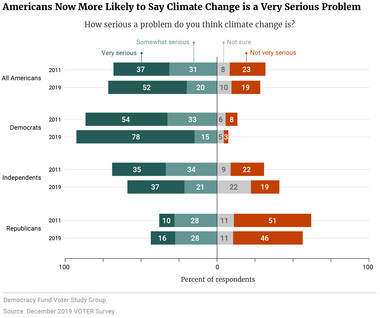
Similar to Democrats, the number of Republicans who say that climate change is a very or somewhat serious problem was lower in 2011 (38 percent) than it is today (44 percent). However, there has not been as remarkable a shift in the intensity of this view. There has been only a 6-percentage-point increase in the number of Republicans who say climate change is a very serious problem between 2011 (10 percent) and 2019 (16 percent).
By contrast, independents are now less likely to view climate change as a somewhat or very serious problem (58 percent) than they were in 2011 (69 percent). Similar to their response to the question of climate change’s existence, more independents today are unsure about the seriousness of global warming than they were in 2011 (22 percent vs. 9 percent).
Finally, the number of Americans who believe that climate change is related to pollution from human activities has increased slightly between 2011 (56 percent) and 2019 (61 percent). However, Americans today are also just as likely to say that climate change is occurring through natural causes unrelated to human activity as they were in 2011 (22 percent in both years).
Again, these shifts mask differences among partisan groups. In 2011 about three-quarters (73 percent) of Democrats said climate change is caused by pollution from human activities. Today, 83 percent of Democrats hold the same view — a 10-percentage-point increase over eight years.
Republican views on the cause of climate change have been mostly stable. Similar numbers of Republicans understood that climate change is related to human activities in 2011 (30 percent) and 2019 (32 percent). The number who believed that climate change was caused by natural forces was also stable (47 percent in both years).
By contrast, independents were actually less likely to say climate change was caused by human activity in 2019 (47 percent) than they were in 2011 (53 percent). More independents express uncertainty about the causes of climate change today than they did in 2011 (33 percent vs. 27 percent).
Figure 3
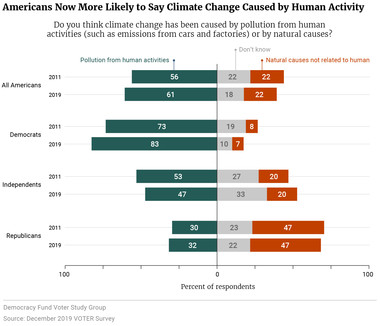
Since the VOTER Survey tracks the same respondents over time, we can study the extent to which individuals are changing their minds as well as their characteristics.
To describe who is changing their minds and how, we limit the analysis to those respondents who answered the climate change questions in both 2011 and 2019 — a sample of 3,693 individuals. To categorize how individuals changed over time, we collapsed their responses into one of three categories for both 2011 and 2019: climate change acceptance, climate change skepticism, and uncertainty. The table below describes how that categorization was handled for the three questions analyzed in the previous section.
Table 1
| Question | Climate Change Acceptance | Climate Change Skepticism | Uncertainty |
|---|---|---|---|
| Do you think climate change is happening? | Definitely/probably happening | Definitely/probably not happening | Not sure |
| How serious a problem do you think climate change is? | Very/somewhat serious | Not very serious | Not sure |
| Do you think climate change has been caused by pollution from human activities (such as emissions from cars and factories) or by natural causes? | Pollution from human activities | Natural causes not related to humans | Don't know |
Individuals were classified as having changed their mind if they gave a response that fell into one category in 2011 and another in 2019. Individuals who did change their mind were further classified as having shifted toward a belief in the existence, seriousness, and human-caused nature of climate change or away from such beliefs. For example, someone giving a skeptical response in 2011 who gave an acceptance or uncertainty response in 2019 would be classified as shifting toward acceptance of climate change. An individual who expressed uncertainty in 2011 and gave a climate change acceptance response in 2019 would be similarly classified. In contrast, those shifting toward skepticism from either acceptance or uncertainty with regard to the existence, seriousness, and human-caused nature of climate change would be classified as shifting away from such beliefs.
Overall, substantial numbers of Americans changed their minds about the existence (24 percent), seriousness (20 percent), and causes (31 percent) of climate change.
This amount of change is similar to the level of change observed on other issues. For example, using an analogous method of classification, about 1 in 5 (20 percent) Americans changed their minds about whether it is the government’s responsibility to see to it that everybody has health care coverage. About one-third (34 percent) changed their minds about whether the government should provide a way for undocumented immigrants in the U.S. to become citizens. Almost half (47 percent) of Americans changed their minds about whether the government should make it harder or easier for immigrants to enter the U.S.
Those belonging to different political parties changed their minds at substantially different rates. Between 2011 and 2019, Republicans were more likely than Democrats to change their beliefs about the existence (41 percent vs. 12 percent), seriousness (32 percent vs. 12 percent), and causes (40 percent vs. 23 percent) of climate change.
While about a quarter (24 percent) of Americans changed their mind about the existence of climate change between 2011 and 2019, these shifts did not result in large shifts in the total levels of belief in its existence. This is because the number of Americans who shifted toward accepting that climate change is happening (12 percent) was balanced out by an equal number of Americans shifting toward skepticism (12 percent).
This balance between individuals shifting in opposing directions holds among different partisan groups. For example, while about 1 in 5 (19 percent) Republicans shifted toward an understanding that climate change is happening, only slightly more (22 percent) shifted toward a belief that it is not happening. Likewise, similar numbers of Democrats (6 percent vs. 5 percent) and independents (14 percent vs. 12 percent) shifted toward an understanding that climate change is happening and toward a belief that it is not.
Figure 4
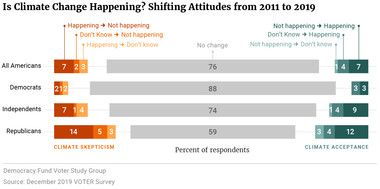
While 1 in 5 (20 percent) Americans changed their minds about the seriousness of climate change, these changes were once again balanced by equal numbers of Americans shifting toward thinking it is a serious problem (10 percent) and toward thinking it is not a serious problem (10 percent).
Democrats were slightly more likely to start thinking climate change is a serious problem (7 percent) than to start thinking it is not a problem (4 percent). Independents were slightly less likely to start thinking climate change is a serious problem (10 percent) as they were to shift in the other direction (13 percent). Republicans were also less likely to have accepted the seriousness of climate change (14 percent) than they were to start thinking that it is not a serious problem (20 percent).
Figure 5
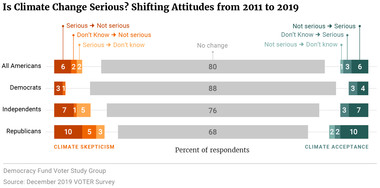
The only issue where we see a slight imbalance among Americans changing their minds is on the causes of climate change. While 17 percent of Americans have shifted toward believing that climate change is caused by humans, 14 percent shifted toward believing it is caused by natural factors unrelated to humans.
On this facet of the issue there are stark differences between different partisan groups. Democrats were about twice as likely to shift toward an understanding that climate change is caused by human activity than to shift toward believing that it primarily caused by natural forces (15 percent vs. 7 percent).
By contrast, Republicans were more likely to shift toward a belief in natural factors causing climate change than to shift toward understanding that human activities are the cause (23 percent vs. 17 percent). Independents were just about as likely to shift toward attributing climate change to natural forces as they were to shift toward attributing it to human activity (15 percent vs. 17 percent).
Figure 6
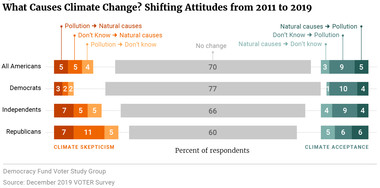
As documented in the previous section, climate change is an issue that deeply divides partisans in the United States. Democrats — already likely to understand that climate change is happening, serious, and the result of human activity in 2011 — were more likely to shift toward these views than to shift toward more skeptical views. By contrast, Republicans were substantially less likely than Democrats to hold these views in 2011. Those who changed their minds since then were, if anything, more likely to move toward skeptical views of climate change. Still, in the aggregate Republicans today are slightly more likely than they were in 2011 to believe that climate change is happening, serious, and caused by human activities.
What is less clear is where partisans will go from here.
Notably, there are substantial generational divides within the Republican party. According to data from Pew Research Center, Millennial and Generation Z Republicans are more likely think the government is doing too little to reduce the effects of climate change, more likely to support developing alternative energy sources, and less likely to favor the expanded use of carbon-based energy sources.(iii) Similarly, data from the Yale Program on Climate Change Communication also shows that young Republicans are more worried about climate change than are older Republicans.(iv)
We see a similar dynamic in the VOTER Survey data. Republicans under 30 today are substantially more likely than Republicans over 65 to think climate change is definitely or probably happening (55 percent vs. 41 percent). Of those Republicans who believe in the possibility of climate change, young Republicans are also substantially more likely than older Republicans to think that it is very or somewhat serious (59 percent vs. 37 percent) and caused by pollution from human activities (49 percent vs. 24 percent).
These kinds of consistent age divides on climate change do not exist among Democrats and independents.
Republican age divides on climate change also appear to align with more substantive electoral differences. For example, young Republicans are less likely than their senior co-partisans to say that they intend to vote for Donald Trump (84 percent vs. 94 percent) or for the Republican candidate in their congressional district (87 percent vs. 97 percent) in the 2020 election.
One possibility is that age-based divides like the ones documented here represent durable cohort differences. Younger and older Republicans may have different attitudes that endure as younger generations age and make up a more substantial portion of the party.
Alternatively, these differences may reflect lower levels of “partisan learning” among younger Republicans. One consistent finding in political science is that people who pay more attention to politics are also more likely to express views that are consistent with the platforms of the political party to which they belong. These individuals are more likely to be exposed to a series of “cues” from political leaders — messages that provide information about the platforms and beliefs of a political party — and are subsequently more likely to hold those views.
Relative to older Americans, those under 30 are generally less likely to be engaged with and pay attention to politics. As such, we’d expect these younger cohorts to have views that are more out of line with the party. Conversely, if this is a story of partisan learning, we’d expect younger cohorts to become more like older cohorts as they age and become more engaged with politics.
Data from the VOTER Survey provide some evidence for partisan learning. Specifically, when it comes to whether or not climate change is happening, there is evidence of partisan learning among Republicans.(3) Young Republicans were much more likely to shift toward believing that climate change is not happening than to shift toward understanding that it is happening. For example, we’d expect a 20-year-old Republican in 2011 to have a 31 percent chance to start believing that climate change is not happening by 2019. We’d expect that same 20-year-old to have just a 20 percent chance of changing their mind toward belief in the existence of climate change.
We see similar evidence for partisan learning when it comes to the seriousness of climate change. A 20-year-old Republican in 2011 had a 17 percent chance of shifting toward viewing climate change as a somewhat or very serious problem and a 24 percent chance of shifting toward viewing it as not a problem. As these younger Republicans aged, they became more likely to adopt the views of older Republicans about the occurrence and seriousness of climate change.
(3) Analysis of how Democrats and Republicans changed their minds is based on multinomial models where we predict whether (a) individuals shift toward a belief in the occurrence, seriousness, and human-caused nature of climate change; (b) away from such beliefs; or whether they (c) do not change their mind at all. Age was introduced as a continuous variable.
Figure 7
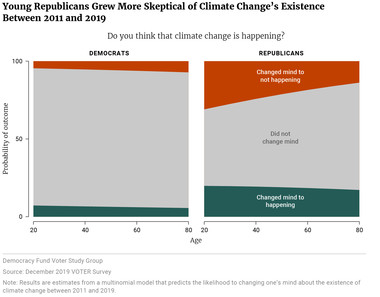
On these two issues there is not evidence of a durable cohort difference in views. In 2011, Republicans under 30 were 12 percentage points more likely than those over 65 to say that climate change was happening (46 percent vs. 34 percent) and 20 percentage points more likely to say the climate change was a serious problem (52 percent vs. 32 percent). By 2019, both younger and older Republicans were more likely to say that climate change was happening (55 percent vs. 41 percent) and that it was a serious problem (59 percent vs. 37 percent). However, the age gaps on these issues (14 percentage points and 22 percentage points, respectively) were similar to the gaps from 2011.
Still, there is some evidence of a cohort difference on the intensity of views about the seriousness of climate change. While Republicans under 30 were three percentage points more likely than those over 65 to say that climate change was a very serious problem in 2011 (11 percent vs. 8 percent), they were 12 percentage points more likely to do so in 2019 (23 percent vs. 11 percent).
We do not see strong evidence of partisan learning among Republicans when it comes to the causes of climate change. A 20-year-old Republican was more likely to start understanding that climate change is caused by human activity (30 percent chance) than to start believing that it is primarily caused by natural forces (19 percent change). By contrast, a 70-year-old Republican had a 10 percent chance of shifting toward understanding that climate change is human-caused and a 24 percent chance of moving toward believing that climate change is naturally occurring. Younger and older segments of the party moved in opposite directions in their views of the causes of climate change.
Figure 8
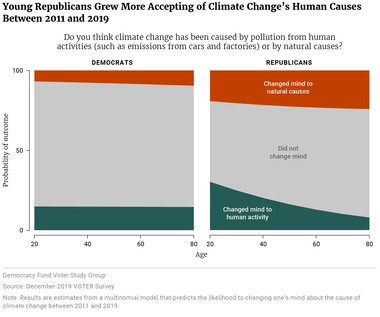
There is additional evidence of a cohort-based difference among Republicans on this issue. In 2011, there was a 15-percentage-point gap between the number of Republicans under 30 and over 65 who said that climate change was caused by human activity (41 percent vs. 26 percent). By 2019, that gap had grown to 25 percentage points (49 percent vs. 24 percent).
These increasing gaps between younger and older members of the party could indicate a durable wedge: Young Republicans are departing from the party line of skepticism about the seriousness and human causes of climate change in numbers that appear distinct from what a purely “partisan learning” story would suggest.
Across all three of these questions, Democrats of all ages were about equally likely to shift toward climate change skepticism and climate change acceptance. Likewise, the gaps between the views of younger and older Democrats remained largely stable between 2011 and 2019.
Climate change is one of the most important challenges our society faces today, and public understanding and concern about the problem are crucial for enacting policy to address it. In the past nine years, the issue has become more politicized, with Democrats becoming convinced about existence, seriousness, and human causes of climate change at a faster rate than Republicans.
Younger cohorts of Republicans have often been cast as a force for change within the party on the issue of climate change. We see evidence that refutes and supports that narrative.
On one end the spectrum, Republican views on the existence of climate change exhibit evidence of partisan learning; there is little to suggest that there are enduring cohort differences between young and old Republicans. Younger Republicans are adopting the views of older Republicans, and there is not strong evidence of any leftward shift among the younger cohort.
Among those who accept that climate change is occurring, views on the seriousness of climate change are a mixed bag — with evidence of both partisan learning and cohort differences. Younger Republicans are becoming more like older Republicans over time in whether they view climate change as a somewhat or very serious problem, although the youngest cohort appears to take climate change more seriously than the youngest cohort did eight years before.
On the other end of the spectrum, Republican views on the causes of climate change present the clearest evidence of enduring differences between cohorts. The patterns of change over time do not align neatly with a partisan learning story. Instead, it appears that age-based differences between Republicans have grown over time — younger Republicans are more likely to understand that climate change is caused by human activity than they were in the past. Additionally, among those young Republicans who did change their minds, accepting that human activity is causing climate change was more common than becoming skeptical about that fact.
These trends suggest that a new — though tenuous — generational cleavage may be opening up within the Republican party.
In the past few years, an enthusiastic climate movement has grown in numbers and clout, led by young people on the political left such as Greta Thunberg and the Sunrise Movement. This analysis suggests that young people on the political right are also increasingly aware of the causes and seriousness of climate change. Young Republicans’ greater awareness in these respects represents an opportunity for climate activists seeking to build support among conservatives and Republicans.
Some evidence suggests that individuals respond differently to the terms “global warming” and “climate change.”(v) To test this proposition, we ran an experiment within the VOTER Survey. In 2011, all respondents were asked separately about the existence, causes, and seriousness of “global warming.” Since then, “climate change” has become the more commonly used term for referring to this phenomenon. In the latest wave, respondents were randomly split into two groups. The first group was once again asked about “global warming” while the other was asked about “climate change” in the following questions:
Because respondents were randomly selected to fall into one of the two groups, we expect that any differences in responses would probably be the result of the question wording and not some other factor.
Overall, Americans do not appear to respond differently to these terms. When asked about “global warming,” the majority of Americans say that it is either definitely (48 percent) or probably (19 percent) happening. A nearly identical number of Americans say the same when asked about “climate change” (48 percent and 20 percent, respectively).
We see the same pattern on other related questions. Regardless of whether they’re asked about “global warming” or “climate change,” Americans are just about as likely to say it is a very (53 percent vs. 50 percent) or somewhat (19 percent vs. 21 percent) serious problem. Similarly, Americans are no more likely to say “global warming” has been caused by pollution from human activities than they are to say the same about “climate change” (62 percent vs. 60 percent, respectively).
Subscribe to our mailing list for updates on new reports, survey data releases, and other upcoming events.